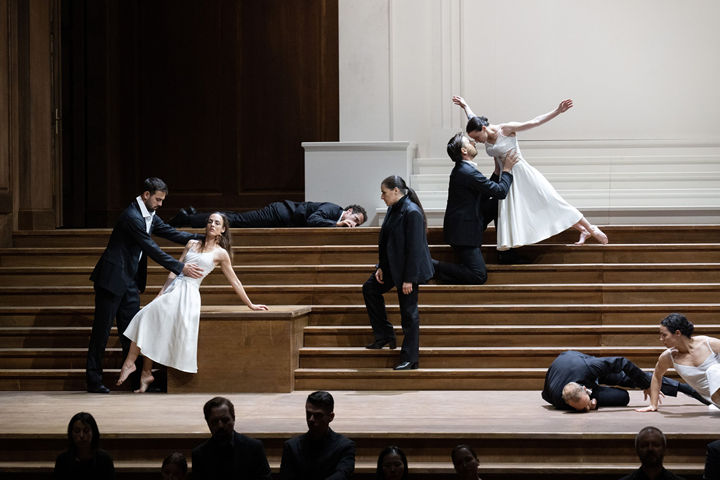| Opera Reviews | 2 May 2024 |
Cecilia Bartoli leads in a captivating performanceby Moore Parker |
|
Gluck: Orfeo ed Euridice |
|

|
|
|
The choice for this production (a revival from the 2023 Whitsun Festival) fell to the seldom-performed Parma version of 1769 in which the soprano castrato Giuseppe Millico sang the lead. Ballet music from the Paris production from 1774 augmented the essence of the 1762 Vienna original to make up this Salzburg 90-minute one-act evening. The cyclical experience of loss which all humans in some form experience opens and closes this production with the vitally compelling contribution by twelve dexterous dancers, who introduce and close Orfeo’s tale, while reflecting on his emotions and experiences throughout the action. Indeed the entire evening lends a sense of being choreographed both in individual movement and character play with all protagonists isolated - while yet in intimate interaction. Christof Loy is responsible for both direction and choreography and manages to create a dramatic, timeless, and intimate experience through his concept. This sense of isolation or anonymity is reflected in Johannes Leiacker’s noble, yet frugal, setting - a simple central staircase leading to a white aperture which opens and closes to hail the changes of state as Orfeo progresses through his voyage. The entirety is framed by wood-panelled walls which hint at the neighbouring Karl Böhm Saal - somehow splicing Orfeo’s loss with those seated in the auditorium beyond the proscenium arch. The lighting (Olaf Winter) remained particularly subtle - possibly to a fault - but together with the one-set concept, served to thrust total focus on the protagonists. Loy succinctly employed the chorus, Il Canto di Orfeo, (coincidentally named) between stage activity and the Classical Greek tradition (albeit, here spread in mixed voice categories and genders across the expanse of the footlights) to enormous effect. Their contribution was exquisite throughout. In the title role, Cecilia Bartoli appears in her first Orfeo production. 1988 saw her initial professional association with the Salzburg Festival when she came to the attention of Herbert von Karajan. The Maestro’s death in 1989 sadly thwarted their plans but in 1994 a relationship between Salzburg and the Italian singer was initiated which has blossomed through a commanding range of personal performances in addition to her more recent undertaking as Artistic Director of the Whitsun Festival. This season the Austrian State honoured Miss Bartoli with the title of “Österreichischer Kammersänger”. At age 57, Bartoli’s vocal instrument testifies to judicious engagement over the decades, still remaining steady in tone, clear in enunciation and timbre, and nimble in response to intent. Combined with the singer’s familiar intensity and winning stage presence, this Orfeo truly made its mark - if on occasion leaving one wishing for greater “bite” and depth of tone to support the emotions to hand. Mélissa Petit sang and played a model Euridice with ample vocal and dramatic ability to present an ideal foil to Bartoli’s Orfeo. Their great duet was arguably the artistic highlight of the evening. As Amore, Madison Nonoa combined a delightfully sweet timbre with a charming and confident stage manner. Les Musiciens du Prince - Monaco were actually founded through Cecilia Bartoli’s initiative in 2016 (Bartoli became Artistic Director at the opera there last year). The orchestra is well-familiar to Salzburg audiences, and it’s quality undisputed. This evening under Gianluca Capuano was captivating throughout - spanning a vast dynamic range and variety of colours through to an unbelievably muted and finely-spun finale, and leaving the stunned audience hushed for seconds before an explosion of frenetic appreciation erupted.
|
|







